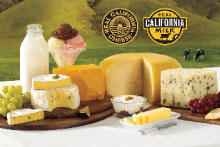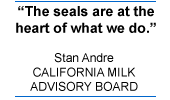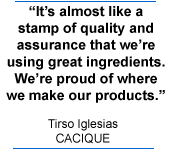 |
|||

|  |

|
|

March 18, 2011 |
||
'Real California' seals prove popular with industry and consumers alike |
||
By Kate Sander SOUTH SAN FRANCISCO, Calif. — It’s only been three-and-a-half years since the California Milk Advisory Board (CMAB) launched its “Real California Milk” seal. However, CMAB, which is tasked with promoting California dairy products on behalf of the state’s dairy farmers, has already seen significant results — increased awareness of California products among customers domestically and internationally, leading to almost 3 billion pounds of milk-equivalent in new, recurring business. The “Real California Milk” (RCM) seal is a follow up to the “Real California Cheese” (RCC) seal, which was first introduced two decades earlier to the California retail market, then to California pizza makers and finally to the entire U.S. market in 2004. The seals can be used free of charge on dairy products using 100 percent California-produced milk. David Freedheim, who is CMAB’s sales consultant and handles the organization’s Mexico business, says it’s a simple pattern that’s led to the success: The state’s identifying seals work in tandem with an integrated marketing program including CMAB’s consumer advertising campaign, in-store demo sampling, instant redeemable coupons and other promotions. “The seals are at the heart of what we do,” adds Stan Andre, CEO of CMAB. The idea of the RCM seal was spurred by both the success of the RCC seal and a CMAB-commissioned report by McKinsey & Co. in 2007 which analyzed the California dairy industry’s future and determined that California milk production would continue to grow but that demand wouldn’t necessarily keep pace without something new to generate it. It also determined the growth in demand couldn’t all be in cheese. “The seal represents a major shift in industry thinking,” Andre said in September 2007 when the RCM seal was launched. “We are setting out to do something no other dairy group has done before — create a strong affinity among consumers nationally for a full range of dairy products from a specific region.” CMAB’s marketing team knew early on that it was a success. The kickoff of the advertising and public relations campaign officially began in October 2007. Just two years later, total awareness of California as a source of dairy products went from 64 to 73 percent when consumers were shown a list. On an unaided basis, without showing consumers a list, 53 percent mentioned California unprompted, up from 45 percent. Purchase intent also saw a full 10 percent gain in just 24 months. In just three years, CMAB has established more than 57 RCM processors as Cacique Inc., a California producer of Hispanic-style cheeses, is one of the companies which utilizes CMAB seals. “It’s almost like a stamp of quality and assurance that we’re using great ingredients,” says Tirso Iglesias, director, sales and marketing, Cacique. “We’re proud of where we make our products. “We’re not a Wisconsin-only driven industry,” he adds. “California is a viable source of quality products.” Certainly, California is not the only state that offers seals and marks for products produced exclusively in a specific state. The Wisconsin Milk Marketing Board, for example, offers the Wisconsin Cheese logo, available for use on Wisconsin-produced cheese. But Andre says there is room for both state’s seals — and others. Some people point to competition between the two leading dairy states (California leads in milk production, Wisconsin leads in cheese production). However, Andre is quick to point out that when CMAB has moved promotions into new markets, sales of all cheese — California and others — went up significantly. Increased product sales help the industry at large, no matter where they are produced, he adds. “If they’re interested in growing business, they have to promote,” Andre says of both dairy processors and retailers. CMAB has done an excellent job of promoting the seals and re-energizing the industry, Iglesias says. “They produce programs that produce sales, and they’re always very willing to listen to manufacturers. It’s really more of a partnership; they’re very proactive in listening and soliciting new ideas,” he says. Todd Fryer, director of corporate brands marketing of California-headquartered Smart & Final stores, says his company utilizes CMAB’s seals on all of its store brand products and also took advantage of CMAB’s comprehensive retail marketing programs in 2010, which includes on-pack coupons, fliers and demos. One promotion involved bringing dairy farmers into Smart & Final’s Henry’s Farmers Market stores to meet and greet consumers during June Dairy Month. (The Henry’s stores are now in the process of being acquired by Sprouts Farmers Market.) Fryer says that Smart & Final, which operates 182 Smart & Final stores, Kelly Olds, CEO, Provisions Food Co., Visalia, Calif., says Provisions Food also has benefitted from CMAB’s activities in trade shows and trade missions, resulting in “dozens of referrals” for the company. In particular, Provisions Food has benefitted from CMAB’s activities in the Pacific Rim, where the company has increased its exports of nonfat dry milk, skim milk powder and other dairy products such as cream cheese. “They show our products where we can’t necessarily afford to go,” Olds says. Provisions Food, which is owned by dairy producers Gary and Donna de Graaf, is proud of where its milk comes from and utilizes the RCM seal on all of its private label dairy products, Olds says. The company also encourages customers to utilize the label on products it co-packs. “I really have come to believe ‘California milk’ means something — not just in California but also outside the state. It’s a badge of honor,” Olds says. Andre says the response to the seals internationally is a bit different than domestically due to differences in marketing, but that the response is very positive both at home and abroad. The international market arena is an important component to California producers’ success, he says. One of the original objectives from the McKinsey study was to establish California dairy products in five countries. In the three -and-a-half years since, CMAB has worked to develop distribution in 11 Asian nations as well as Mexico. Now, California processes and distributes about 40 percent of the milk that leaves the United States, Andre says. Part of the success can be attributed to CMAB building relationships with two of the biggest perishable food distributors in China as well as working with a public relations firm and key distributors in Mexico. Since moving into the Mexico market just over three years ago, CMAB has developed distribution in 1,400 retail store locations in Mexico for many dairy products carrying either the RCM or RCC seals. CMN
|
||
| CMN article search |
|
|
© 2025 Cheese Market News • Quarne Publishing, LLC • Legal Information • Online Privacy Policy • Terms and Conditions
Cheese Market News • Business/Advertising Office: P.O. Box 628254 • Middleton, WI 53562 • 608/831-6002
Cheese Market News • Editorial Office: 5315 Wall Street, Suite 100 • Madison, WI 53718 • 608/288-9090


 partners, using the RCM seal on hundreds of products sold locally, nationally and internationally. More than 40 additional manufacturers use the RCC seal.
partners, using the RCM seal on hundreds of products sold locally, nationally and internationally. More than 40 additional manufacturers use the RCC seal. currently is working to finalize the 2011 promotion schedule with CMAB, and the company plans to continue fully utilizing CMAB’s offerings. While it’s difficult to concretely measure the effect of CMAB promotions on company sales, “anytime we had an event, we saw a lift in sales,” he says, attributing this to both the increased visibility of products and the availability of products at lower prices due to specials and coupons. The in-store promotions CMAB offers also are well tied to its broader promotions, such as Happy Cows billboards, which increases consumers’ connectedness to California dairy products, he notes.
currently is working to finalize the 2011 promotion schedule with CMAB, and the company plans to continue fully utilizing CMAB’s offerings. While it’s difficult to concretely measure the effect of CMAB promotions on company sales, “anytime we had an event, we saw a lift in sales,” he says, attributing this to both the increased visibility of products and the availability of products at lower prices due to specials and coupons. The in-store promotions CMAB offers also are well tied to its broader promotions, such as Happy Cows billboards, which increases consumers’ connectedness to California dairy products, he notes.